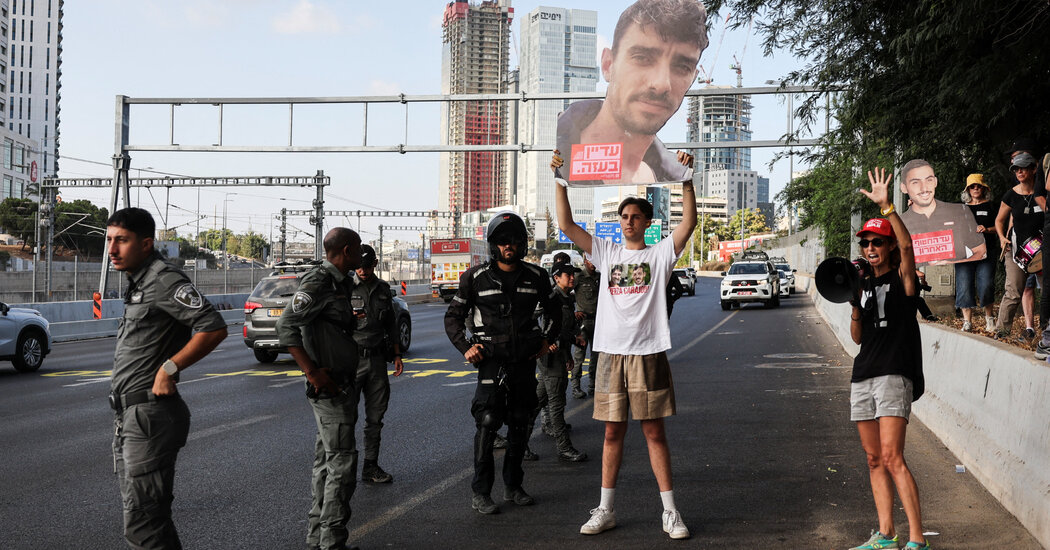For months, the Israeli government had focused on negotiating a two-phased deal for a 60-day cease-fire in Gaza and the release of some hostages, leaving discussions about a permanent end to the war for a later stage.
With the talks now at an impasse, American and Israeli officials appear to be sharply changing their tone by signaling that they will push for a comprehensive deal. But Israel and Hamas remain far apart, and it was unclear if a new approach would be more likely to secure an agreement.
The shift, at least in rhetoric, comes as the Israeli government faces rising domestic pressure to secure the release of hostages still held in Gaza. Israel believes that about 20 are still alive and that the bodies of another 30 remain in the enclave. Videos released over the weekend showed two living captives looking emaciated and frail, shocking many Israelis and sparking fear among the hostages’ families.
The Israeli government has also come under mounting international criticism over the mass hunger that has spread through Gaza’s population of about 2 million people after Israel imposed strict restrictions in recent months on the entry of aid.
Steve Witkoff, the Trump administration’s special envoy to the Middle East, who is visiting the region, met with families of Israeli hostages on Saturday and told them that President Trump now wants to see all the living hostages released at once.
“No piecemeal deals, that doesn’t work,” he said, according to an audio recording of part of the meeting published by the Ynet Hebrew news site.
“Now we think that we have to shift this negotiation to ‘all or nothing’ — everybody comes home,” he said. “We have a plan around it,” he added, without elaborating. A participant in the meeting confirmed that Mr. Witkoff made such remarks.
Israel and Hamas do not negotiate directly. Instead, negotiations for a cease-fire between the two sides have run through intermediaries: The United States, Qatar and Egypt.
Prime Minister Benjamin Netanyahu of Israel and Mr. Trump are said to be working on a new proposal that would involve presenting Hamas with an ultimatum, according to reports in the Israeli news media that were confirmed on Sunday by a person familiar with the matter. The White House was not immediately available for comment.
Under the terms of the ultimatum, Hamas would have to release the remaining hostages in exchange for Palestinian prisoners and agree to terms to end the war that include the group’s disarmament. Otherwise, the Israeli military would continue its campaign.
Mahmoud Mardawi, a Hamas official, said the Palestinian armed group had yet to receive a formal Israeli proposal for a comprehensive deal from Arab mediators. He said that while Hamas supported a comprehensive agreement in principle, it would not disarm — which has long been a core Israeli condition.
“This has been our demand from the beginning: an end to the war, the release of prisoners, and day-after arrangements in the Gaza Strip — a clear and comprehensive deal,” Mr. Mardawi said in a phone interview.
The prospects of any rapid advancement toward such a deal appear dim.
Hamas has consistently rejected Israel’s terms for ending the war throughout the negotiations. On Saturday, the group said in a statement that it would not disarm unless a Palestinian state was established, despite a call from Arab states last week for the group to do so.
The Israeli government, meanwhile, opposes the notion of Palestinian statehood.
Many Israelis say they support a comprehensive deal to return all the hostages and end the war. At the same time, many are skeptical that one can be achieved under the conditions set by the hard-line Israeli government, which has vowed to continue fighting until Hamas surrenders or is destroyed.
Efrat Machikawa, the relative of a released hostage, said that reports attributed to anonymous Israeli officials about there being a comprehensive deal on the table were “empty slogans.”
“The preconditions set by Israel are unrealistic and unworkable,” she said, speaking at a rally on Saturday in Tel Aviv.
Mr. Mardawi, the Hamas official, said that Hamas saw little reason to negotiate with Israel given the dire humanitarian situation in Gaza. “What is the point of talks when people are dying of starvation?” he said.
In recent days, amid mounting international criticism, Israel has facilitated the entry of more aid into Gaza.
The hunger crisis worsened after Israel’s government imposed severe restrictions on aid entering the territory. Israel has blamed aid agencies for mismanaging supplies and has accused Hamas of diverting aid. But some Israeli military officials said the military never found proof that Hamas had systematically stolen aid from the United Nations, the biggest supplier of emergency assistance to Gaza for most of the war.
More than 60,000 Palestinians have been killed in Gaza since the war began, including thousands of children, according to the Gaza health ministry, which does not distinguish between civilians and combatants.
The Hamas-led attack on Israel on Oct. 7, 2023, which ignited the war, killed about 1,200 people, according to the Israeli government, and about 250 people were taken captive to Gaza. More than 100 hostages were freed during previous cease-fires and Israeli forces operating in the enclave have retrieved the bodies of some others.
Ruby Chen, the father of the American-Israeli soldier Itay Chen, who was abducted by Hamas, attended the meeting on Saturday with Mr. Witkoff. Mr. Chen’s son is now presumed dead by the Israeli authorities.
He said Mr. Witkoff had discussed the need for a comprehensive deal, rather than a partial deal. “After six months, they’ve now come to the understanding that it’s not possible to execute it,” said Mr. Chen. “We lost six months on this.”
Lia Lapidot contributed reporting
Isabel Kershner, a Times correspondent in Jerusalem, has been reporting on Israeli and Palestinian affairs since 1990.
Aaron Boxerman is a Times reporter covering Israel and Gaza. He is based in Jerusalem.
The post U.S. and Israeli Officials Float Idea of ‘All or Nothing’ Gaza Deal appeared first on New York Times.




